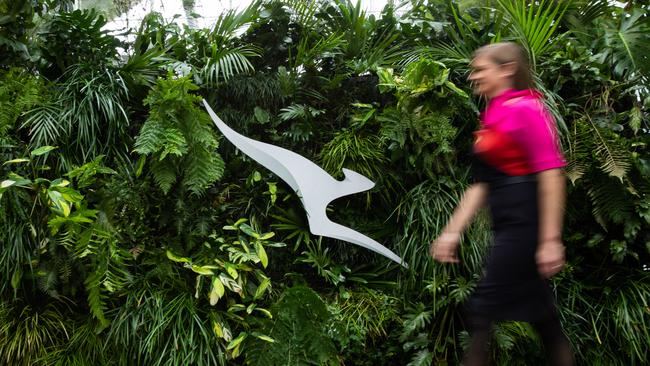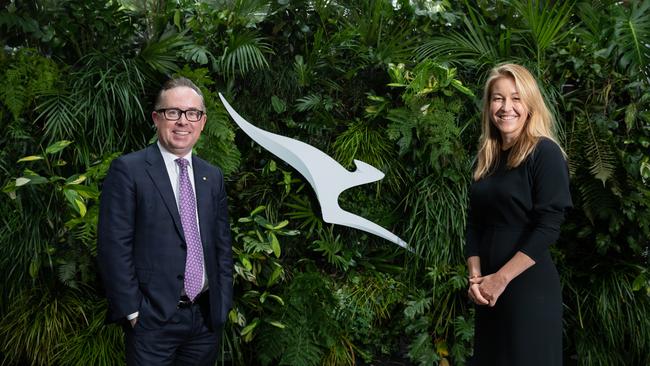Qantas applies political pressure as it aims for net zero emissions by 2050
The airline has spelled out what it will do to decarbonise air travel in Australia, and tipped passengers will be prepared to pay more to fly sustainably.

Qantas has predicted travellers will be willing to pay more to fly sustainably as the airline strives to achieve net zero emissions by 2050.
Speaking in Sydney on Thursday, Qantas CEO Alan Joyce mapped out the airline’s environmental road map, saying decarbonising air travel was “key” to their future.
In order to reach net zero, Qantas would continue to increase its use of sustainable aviation fuel to 10 per cent of its fuel mix by 2030, and 60 per cent by 2050.
Single use plastics would be eliminated from the airline by 2027 and no general waste would be going into landfill by 2030.
“Greener” aircraft types like the A320neo, Boeing 787 and A350 would help achieve a 1.5 per cent improvement in fuel efficiency a year, while research continued into next generation technologies such as hydrogen and battery power.
Mr Joyce said responding to climate change was a big challenge, but Qantas would get there.
“We’ve had a zero net emissions goal for several years so today’s interim targets are about accelerating our progress and cutting emissions as quickly as technology allows,” he said.
“One benefit of setting these targets now is sending a clear signal that we’re in the market for large volumes of sustainable aviation fuel (SAF), for carbon offset projects and for products that can be recycled.
“That will hopefully encourage more investment and build more momentum for the industry as a whole.”

He revealed Qantas had been talking to both sides of politics in the hope of securing an election commitment on investment into the development of a SAF industry in Australia.
Qantas recently announced a deal with a US company to buy SAF in California, and also has a deal with a supplier in the UK.
Mr Joyce said Australia was falling behind the rest of the world in the development of an industry that could deliver significant jobs and environmental benefits as well as fuel security.
“We don’t believe either side (of politics) is moving fast enough (but) we are starting to get some traction,” he said.
“We tried to do this behind the scenes. Unfortunately you do sometimes need to make things public. That’s what we’re having to do in order to get there.”
Qantas chief sustainability officer Andrew Parker said it would be a missed opportunity if Australia did not develop its own SAF industry, with the sort of materials needed, such as agricultural waste, in plentiful supply.
“We are seeing some early signs (from the Coalition and Labor) but we do want to see some policy certainty,” said Mr Parker.
“It does have to be a big investment. The Biden Administration announced a multi-billion dollar package, the Europeans and the UK are investing billions as well into the development of SAF so it’s a nascent industry but one that Australia needs.”
Despite currently costing up to five times more than traditional aviation fuel, the hope was that as the scale of SAF production increased it would become cheaper than fossil fuels.
Mr Joyce suggested passengers would be happy to pay more to fly greener, based on the success of the airline’s carbon offsets program, which had the highest take-up rate in the world.
About 11 per cent of travellers now offset their flights with Qantas, compared to the global average of 1 to 1.5 per cent.
“What we have seen from our customer base is a lot of customers are willing to pay more to travel sustainably and we are getting that now with more and more customers,” Mr Joyce said.
In order to keep up with demand for carbon offsets, Qantas announced a deal with ANZ Bank and Japanese petroleum and exploration company INPEX for a massive integrated reforestation and carbon farming project in Western Australia’s wheatbelt region.
Covering an area the size of Belgium, the project would involve replanting marginal farming land with native plant species to improve the environment and generate carbon credits to help offset the three companies’ future carbon footprints.
In an effort to bring the community on board Qantas’s sustainability drive, the airline recently announced a new “green tier” for its popular frequent flyer program.
Qantas Loyalty CEO Olivia Wirth told investors at Thursday’s presentation, the program had significant influence over its 13 million plus members which they wanted to use for good.
Since the launch of the “green tier” three weeks ago, setting up to six challenges for frequent flyers to demonstrate their commitment to sustainability, 150,000 people had participated.
Those who ticked off five of the six challenges, stood to be rewarded with 10,000 frequent flyer points, 50 status credits, or three tonnes of carbon offsets purchased by Qantas on their behalf.
CSIRO technology and innovation analyst Warren Flentje said without community support it would be impossible to achieve the sort of targets Qantas was aiming for.
“I think that’s a really powerful way to drive a mindset shift, a behaviour change,” said Mr Flentje.






To join the conversation, please log in. Don't have an account? Register
Join the conversation, you are commenting as Logout